Related Research Articles

The Iraqi National Congress is an Iraqi political party that was led by Ahmed Chalabi who died in 2015. It was formed as an umbrella opposition group with the aid and direction of the United States' government following the Persian Gulf War, for the purpose of fomenting the overthrow of longtime Iraqi President Saddam Hussein.

The Defense Intelligence Agency (DIA) is an intelligence agency and combat support agency of the United States Department of Defense, specializing in defense and military intelligence.

Ahmed Abdel Hadi Chalabi was an Iraqi politician, dissident, a founder of the Iraqi National Congress (INC) who served as the President of the Governing Council of Iraq and a Deputy Prime Minister of Iraq under Ibrahim al-Jaafari.
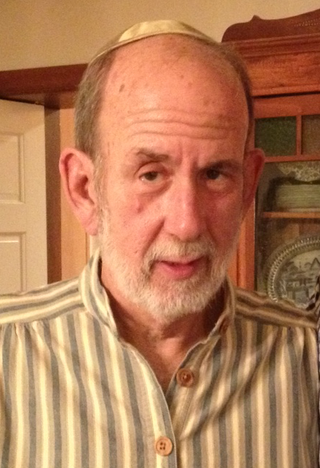
Michael Arthur Ledeen is an American historian and neoconservative foreign policy analyst. He is a former consultant to the United States National Security Council, the United States Department of State, and the United States Department of Defense. He held the Freedom Scholar chair at the American Enterprise Institute where he was a scholar for twenty years and now holds the similarly named chair at the Foundation for Defense of Democracies. He was very close to Antonio Martino.

The Special Activities Center (SAC) is a division of the United States Central Intelligence Agency responsible for covert and paramilitary operations. The unit was named Special Activities Division (SAD) prior to 2015. Within SAC there are two separate groups: SAC/SOG for tactical paramilitary operations and SAC/PAG for covert political action.

The Niger uranium forgeries were forged documents initially released in 2001 by SISMI, which seem to depict an attempt made by Saddam Hussein in Iraq to purchase yellowcake uranium powder from Niger during the Iraq disarmament crisis. On the basis of these documents and other indicators, the governments of the United States and the United Kingdom asserted that Iraq violated United Nations sanctions against Iraq by attempting to procure nuclear material for the purpose of creating weapons of mass destruction.

Theodore George "Ted" Shackley, Jr. was an American CIA officer involved in many important and controversial CIA operations during the 1960s and 1970s. He is one of the most decorated CIA officers. Due to his "light hair and mysterious ways", Shackley was known to his colleagues as "the Blond Ghost".

Robert Booker Baer is an American author and a former CIA case officer who was primarily assigned to the Middle East. He is Time's intelligence columnist and has contributed to Vanity Fair, The Wall Street Journal, and The Washington Post. Baer speaks eight languages, won the CIA Career Intelligence Medal and is a frequent commentator and author about issues related to international relations, espionage, and U.S. foreign policy. He hosted the History reality television series Hunting Hitler. He is an Intelligence and Security Analyst for CNN. His book See No Evil was adapted by the director Stephen Gaghan and used as the basis for the film Syriana, with George Clooney playing Baer's character.
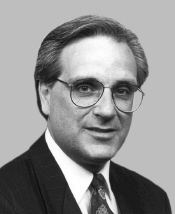
Ronald Paul Klink is an American television broadcaster and politician and who served four terms as a United States Representative from Pennsylvania from 1993 to 2001, as member of the Democratic Party.

Rafid Ahmed Alwan al-Janabi, known by the Defense Intelligence Agency cryptonym "Curveball", is a German citizen who defected from Iraq in 1999, claiming that he had worked as a chemical engineer at a plant that manufactured mobile biological weapon laboratories as part of an Iraqi weapons of mass destruction (WMD) program. Alwan's allegations were subsequently shown to be false by the Iraq Survey Group's final report published in 2004.
Manucher Ghorbanifar is an expatriate Iranian arms dealer and former SAVAK agent.
A "burn notice" is an official statement issued by an intelligence agency to other agencies. It states that an asset or intelligence source is unreliable for one or several reasons, often fabrication, and must be officially disavowed. This is essentially a directive for the recipient to disregard or "burn" all information derived from that individual or group.

Philip Giraldi is an American columnist, commentator and security consultant. He is the Executive Director of the Council for the National Interest, a role he has held since 2010. He was previously employed as an intelligence officer for the CIA, before transitioning to private consulting. Giraldi has received criticism for his anti-semitism and Holocaust denial, and has said "those American Jews who lack any shred of integrity" when they appear on television should be labeled "like a warning label on a bottle of rat poison."

The Central Intelligence Agency, known informally as the Agency and historically as the Company, is a civilian foreign intelligence service of the federal government of the United States, officially tasked with gathering, processing, and analyzing national security information from around the world, primarily through the use of human intelligence (HUMINT) and conducting covert action through its Directorate of Operations. As a principal member of the United States Intelligence Community (IC), the CIA reports to the Director of National Intelligence and is primarily focused on providing intelligence for the President and Cabinet of the United States. Following the dissolution of the Office of Strategic Services (OSS) at the end of World War II, President Harry S. Truman created the Central Intelligence Group under the direction of a Director of Central Intelligence by presidential directive on January 22, 1946, and this group was transformed into the Central Intelligence Agency by implementation of the National Security Act of 1947.
National governments deal in both intelligence and military special operations functions that either should be completely secret, or simply cannot be linked to the sponsor. It is a continuing and unsolved question for governments whether clandestine intelligence collection and covert action should be under the same agency. The arguments for doing so include having centralized functions for monitoring covert action and clandestine HUMINT and making sure they do not conflict, as well as avoiding duplication in common services such as cover identity support, counterespionage, and secret communications. The arguments against doing so suggest that the management of the two activities takes a quite different mindset and skills, in part because clandestine collection almost always is on a slower timeline than covert action.
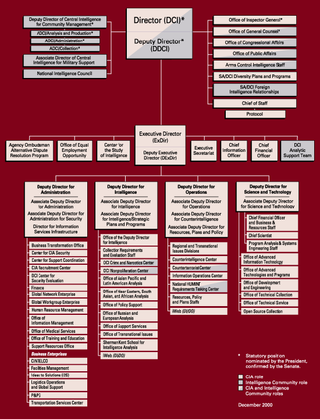
The CIA publishes organizational charts of its agency. Here are a few examples.
The Interagency Active Measures Working Group was a group led by the United States Department of State and later by the United States Information Agency (USIA). The group was formed early during the Reagan administration, in 1981, purportedly as an effort to counter Soviet disinformation.
State-sponsored Internet propaganda is Internet manipulation and propaganda that is sponsored by a state.
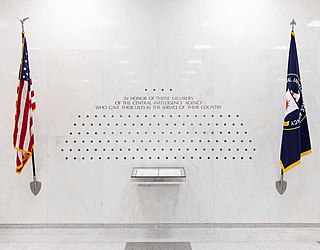
The United States Central Intelligence Agency (CIA) dates from September 18, 1947, when President Harry S. Truman signed the National Security Act of 1947 into law. A major impetus that has been cited over the years for the creation of the CIA was the unforeseen attack on Pearl Harbor, but whatever Pearl Harbor's role, at the close of World War II government circles identified a need for a group to coordinate government intelligence efforts, and the Federal Bureau of Investigation (FBI), the State Department, the War Department, and even the Post Office were all jockeying for that new power.
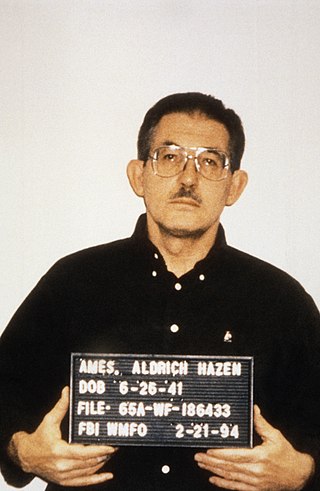
In 1995 it was revealed that the Central Intelligence Agency had delivered intelligence reports to the U.S. government between 1986 and 1994 which were based on agent reporting from confirmed or suspected Soviet operatives. From 1985 to his arrest in February 1994, CIA officer and KGB mole Aldrich Ames compromised Agency sources and operations in the Soviet Union and Eastern Europe, leading to the arrest of many CIA agents and the execution of at least ten of them. This allowed the KGB to replace the CIA agents with its own operatives or to force them to cooperate, and the double agents then funneled a mixture of disinformation and true material to U.S. intelligence. Although the CIA's Soviet-East European (SE) and Central Eurasian divisions knew or suspected the sources to be Soviet double agents, they nevertheless disseminated this "feed" material within the government. Some of these intelligence reports even reached Presidents Ronald Reagan and George H. W. Bush, as well as President-elect Bill Clinton.
References
- ↑ Department of Defense, Dictionary of Military and Associated Terms, , January 31, 2011
- 1 2 3 Dr. Robert L. Managhan, Trends in African Forgeries, , CIA Center for the Study of Intelligence
- ↑ Defense Intelligence Agency, Terms & Definitions of Interest for DoD Counterintelligence Professionals, Archived 2013-07-17 at the Wayback Machine , May 2, 2011
- ↑ Dapartment of Defense, Instruction Number S-5200.42 Defense Human Intelligence, paragraph 4.i., , December 8, 2009
- ↑ The Commission on the Intelligence Capabilities of the United States Regarding Weapons of Mass Destruction, Chapter 7, p. 372, , March 31, 2005
- ↑ Sidney Blumenthal, Weapons of mass dissembling, , Salon, Feb 5 2004
- 1 2 3 Joby Warrick, Warnings on WMD "Fabricator" Were Ignored, Ex-CIA Aide Says, , Washington Post, June 25, 2006
- ↑ Judy Feigin, Striving for Accountability in the Aftermath of the Holocaust, , U.S. Justice Department, Office of Special Investigations, December 2008
- ↑ Paul Woodward, ‘Fabricated’ Israeli threats provoke escalation in threats from Iran, , August 18, 2012
- ↑ Arnold M. Silver, Questions, Questions, Questions, , CIA Center for the Study of Intelligence, May 17, 2005
- ↑ David R. McLean, Cranks, Nuts and Screwballs, , CIA Center for the Study of Intelligence, September 23, 2003
- ↑ Office of the National Counterintelligence Executive, Counter Intelligence Reader Volume 2, Archived 2013-07-17 at the Wayback Machine , Chapter 3: Counterintelligence in the Office of Strategic Services, p. 208
- ↑ Bergman, Ronen. "Operation Red Falcon". Atavist. Archived from the original on 24 July 2015. Retrieved 28 May 2015.
- ↑ Senate Select Committee on Intelligence, Preliminary Inquiry Into The Sale Of Arms To Iran And Possible Diversion Of Funds To The Nicaraguan Resistance, Archived 2012-12-12 at the Wayback Machine
- ↑ Senate Committee on Intelligence, Intelligence Activities Relating to Iraq Conducted by the Policy Counterterrorism Evaluation Group and the Office of Special Plans within the Office of the Under Secretary of Defense for Policy, "Archived copy" (PDF). Archived from the original (PDF) on 2008-06-11. Retrieved 2008-03-28.
{{cite web}}: CS1 maint: archived copy as title (link), June 2009 - ↑ Senator Rockefeller, Congressional Record - Senate, , U.S. Government Printing Office, June 5, 2008
- ↑ CNN, Iraqi minister: Chalabi will be arrested, , January 22, 2005
- ↑ John Dizard, How Ahmed Chalabi Conned the Neocons, , May 5, 2004
- ↑ Alfred Cumming, Congress as a Consumer of Intelligence Information, p. 8, , January 15, 2009
- ↑ Meir Javendanfar, Iranian government stirs up anti-semitism with invented massacre, , The Guardian, 27 December 2010
- ↑ Iranian Press TV accused of faking drone strike report, , The Telegraph, 2 Dec 2011
- ↑ Iranian TV station ‘faked’ Somali deaths by US drones, , Bureau of Investigative Journalism, 2 December 2011
- ↑ Fake rape fatwa story planted by Presstv spread around world by Islamophobes, Archived 2013-06-30 at the Wayback Machine , Islamist.com, 3 January 2013
- ↑ Iran's Press TV blames British royals for loss of licence, , The National, 22 January 2012
- ↑ Minister: Iran to Protest Ban on Press TV through Legal Channels , Archived 2012-04-13 at the Stanford Web Archive , Fars News, 7 April 2012
- ↑ Another legal victory for Press TV, Archived 2012-11-05 at the Wayback Machine , Islamic Radio & Television Union, 16 July 2012
- ↑ Ivan Watson, Defecting Syrian propagandist says his job was "to fabricate", , CNN, October 10, 2012
- ↑ Tetsushi Kajimoto and Kantaro Komiya (15 December 2021). "Japan overstated some construction order data for years, PM says". Reuters.